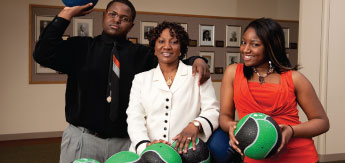 In late February of 2015, 100 residents gathered in the Great Hall at Quincy Market to kick-off the Age-Friendly Boston Initiative (AFB), a five-year initiative that challenges the city’s public agencies, businesses, cultural, educational and religious institutions, community groups and individuals to consider how changes to policy and practice can create a more inclusive city for older adults that is attentive to their needs. Led by the Commission on Affairs of the Elderly, Boston is one of over 30 U.S. cities signed on to this initiative through the AARP, the American partner with the World Health Organization.
In late February of 2015, 100 residents gathered in the Great Hall at Quincy Market to kick-off the Age-Friendly Boston Initiative (AFB), a five-year initiative that challenges the city’s public agencies, businesses, cultural, educational and religious institutions, community groups and individuals to consider how changes to policy and practice can create a more inclusive city for older adults that is attentive to their needs. Led by the Commission on Affairs of the Elderly, Boston is one of over 30 U.S. cities signed on to this initiative through the AARP, the American partner with the World Health Organization.
Ten years ago, the World Health Organization (WHO) became interested in the accelerating urbanization and the rapid growth of aging populations, and the opportunities and challenges it presents for global health. After analyzing 33 cities in 22 countries across the globe, WHO released a guide in 2007, “Global Age-friendly Cities,” which highlights current trends and models to stimulate action in cities through eight domains: 1) housing, 2) transportation, 3) public spaces and building, 4) Social participation, 5) civic engagement and employment, 6) health services and community support, 7) communication and information, and 8) respect and social inclusion.
Andrea Burns, Director of Age-Friendly Boston at the Elderly Commission says that AFB is at the beginning stages of the planning process, with the end goal of identifying priorities and drafting an action plan to become certified as an age-friendly city under those domains. After assessing community strengths, assets, mapping, as well as reviewing existing data from the U.S. Census, Boston Public Health Commission and a recent report released by the Elderly Commission, the next step is to hear from the community. They are focused on building strong partnerships with key organizations and relationships with residents over the age of 50, hearing feedback from the community through listen and learn sessions facilitated by the Gerontology Institute at University of Massachusetts Boston, and connecting with ongoing planning processes, such as Go Boston 2030, transportation planning, Vision Zero, decreasing street fatalities and accidents and BACH’s Mobilizing for Action through Planning and Partnerships.
“It is important that the many planning efforts going in Boston have symmetry and reflect each other’s goals,” states Burns. “It’s a new philosophy, new way of life, so going forward it is important that planning for the City includes every age group.”
Within the next year, AFB hopes to complete 20 listen and learn sessions throughout Boston’s 23 neighborhoods, with an additional three held in the dominant languages: Spanish, Chinese and Haitian Creole. They hope to reach 5,000 residents, about 5% of the older adult population, through the sessions or a survey that was recently released in those languages (Andrea Burns can also be contacted to have stacks delivered). The Elderly Commission wants to ensure that older people are well represented in the plan, ethnically and geographically. Six sessions have already been completed in Beacon Hill, Downtown, East Boston, Hyde Park, Jamaica Plain and Mattapan. Upcomming sessions include:
- Thursday, August 13th in South Boston, 1:00-2:30
- Thursday, September 10th in Dorchester at Codman Square Health Center, 5:30-7
- Thursday, September 17th at Roslindale Public Library, 5:30-7
After the sessions or survey is complete, they AFB hopes to keep older adults involved in the initiative through volunteering for and organizing future efforts. Burns states, “As people get older they can start to feel invisible and it is important way to stay engaged and active in the community and this is one way they can stay engaged.”
For more information about Age-friendly Boston Initiative, please contact Andrea Burns, Director of Age-Friendly Boston at andrea.burns@boston.gov.

